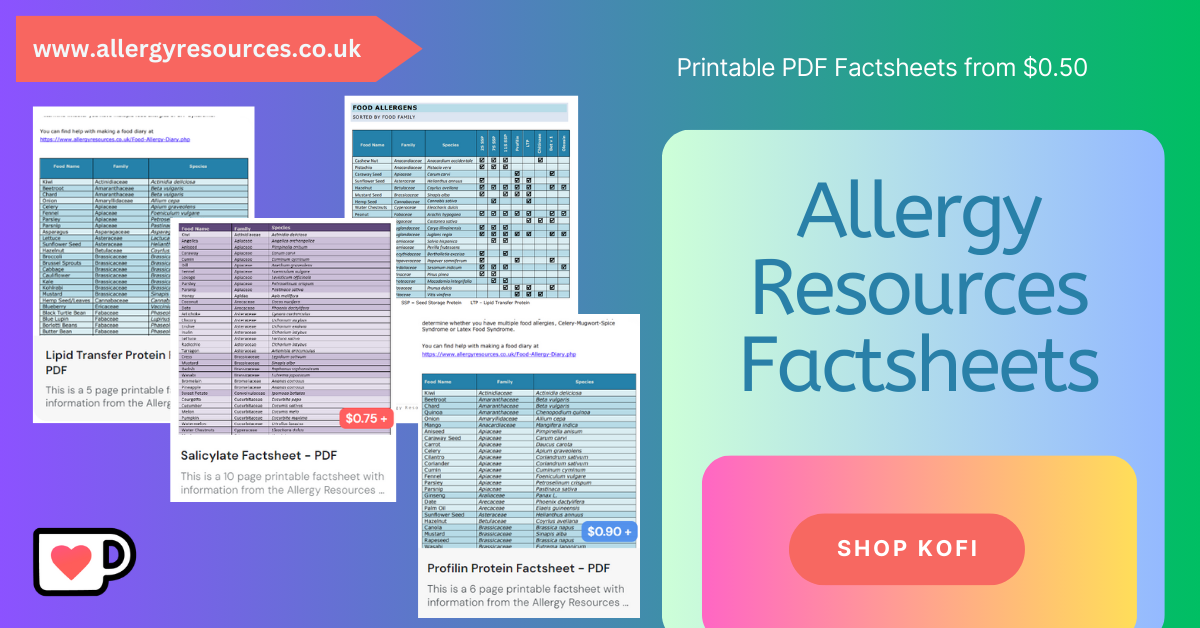
GRAPEFRUIT ALLERGY
Key Allergens
Grapefruits are in the Rutaceae family of plants. Other plants in this family include, oranges, limes and lemons.
Other citrus fruits contain Lipid Transfer Proteins (LTPs). It has been suggested that grapefruit also contain these proteins. LTPs are panallergens with the potential to cause severe allergic reactions.
Grapefruit contains pectin, which has also been shown to cause allergic reactions in some individuals.
Oranges contain gibberellin proteins, there is a possibility that these are also present in grapefruits.
It is strongly advised to avoid eating grapefruit if are taking certain medicines. This is because grapefruit contains naringin, bergamottin and dihydroxybergamottin, all are involved in inhibition of a protein called CYP3A4. The lack of this protein can drastically alter how medications work in the body.
Like other citrus fruits grapefruits contain furanocoumarins. These chemicals can get on the skin and in combination with ultraviolet light (sunlight) can cause a sunburn like rash. Furanocoumarins are found in higher concentrations in fresh herbs and are natural irritants which can cause allergic contact dermatitis. This is more common in occupations where you are frequently coming into contact with the food, like chefs, cooks, growers and pickers.
Other citrus fruits contain Lipid Transfer Proteins (LTPs). It has been suggested that grapefruit also contain these proteins. LTPs are panallergens with the potential to cause severe allergic reactions.
Grapefruit contains pectin, which has also been shown to cause allergic reactions in some individuals.
Oranges contain gibberellin proteins, there is a possibility that these are also present in grapefruits.
It is strongly advised to avoid eating grapefruit if are taking certain medicines. This is because grapefruit contains naringin, bergamottin and dihydroxybergamottin, all are involved in inhibition of a protein called CYP3A4. The lack of this protein can drastically alter how medications work in the body.
Like other citrus fruits grapefruits contain furanocoumarins. These chemicals can get on the skin and in combination with ultraviolet light (sunlight) can cause a sunburn like rash. Furanocoumarins are found in higher concentrations in fresh herbs and are natural irritants which can cause allergic contact dermatitis. This is more common in occupations where you are frequently coming into contact with the food, like chefs, cooks, growers and pickers.
Food Intolerances


Grapefruit is a low FODMAP food, FODMAP stands for Fermentable oligosaccharides, disaccharides, monosaccharides and polyols. Foods high in FODMAPs can cause symptoms of food intolerance, affecting the gastro intestinal system and this can be mistaken for a true IgE food allergy.
Fresh grapefruits are high in salicylates, grapefruit juice is moderate. salicylates. Salicylates have the potential to cause worsening of asthma, swelling, itching and hives as well as food intolerance symptoms in people who are sensitive to salicylates.
You can read more about Food Intolerances on the dedicated Food Intolerance Page.
Associated Syndromes
Grapefruit allergy is linked to Food Dependent Exercise Induced Anaphylaxis, but the allergenic protein responsible for this has not been identified.
Grapefruit is also linked to Latex Food Syndrome. This is usually caused by hevein, chitinase or profilin proteins. To date none of these proteins have been identified in the skin of grapefruits, so it is not known what causes this.
Grapefruit is also linked to Latex Food Syndrome. This is usually caused by hevein, chitinase or profilin proteins. To date none of these proteins have been identified in the skin of grapefruits, so it is not known what causes this.
Cross Reactivity
Other foods containing gibberellins include apricot, peppers, cherries, chilli, oranges, peaches and pomegranates.
Foods containing hevein or chitinase proteins (linking them to Latex Food Syndrome) are avocado, banana, chestnut, coffee, corn, kiwi, pomegranate, apricot, cassava, dill, goji berry, potato, swede and turnip.
Note that these food lists are not exhaustive, the most up to date information is on the Cross Reactivity Tool.
Foods containing hevein or chitinase proteins (linking them to Latex Food Syndrome) are avocado, banana, chestnut, coffee, corn, kiwi, pomegranate, apricot, cassava, dill, goji berry, potato, swede and turnip.
Note that these food lists are not exhaustive, the most up to date information is on the Cross Reactivity Tool.
Resources
Websites
Allergen Encyclopedia - Grapefruit
ATP Science - Salicylate Food List
Articles and Journals
Food allergy outside the eight big foods in Europe: A systematic review and meta-analysis, 2024
Identification of gibberellin-regulated protein as a new allergen in orange allergy, 2018
A squeezable case of anaphylaxis, 2018
Pectin anaphylaxis and possible association with cashew allergy, 2006
Let me know if you found any of these interesting or useful.
If you spot an article or research that you think is interesting you can message me or tag me on Facebook, Instagram or Twitter - links at the bottom of the page.